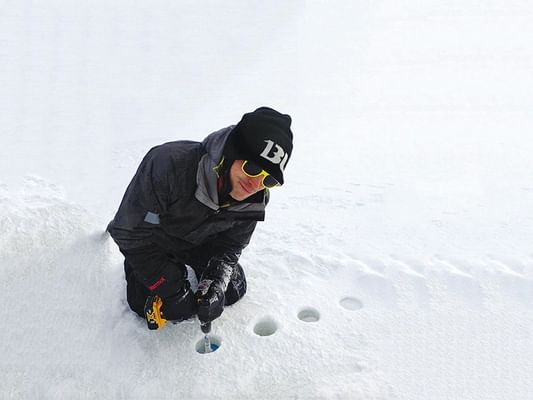- Undergraduate
Bachelor's Degrees
Bachelor of ArtsBachelor of EngineeringDual-Degree ProgramUndergraduate AdmissionsUndergraduate Experience
- Graduate
Graduate Experience
- Research
- Entrepreneurship
- Community
- About
-
Search
All Thayer News

Lab Report: Space Ice
Dec 01, 2021 | by Julie Bonette | Dartmouth Engineer

Image courtesy Jacob Buffo.
An engineering lab at Dartmouth has been awarded two grants totaling $1.25 million to conduct planetary science research relating to the geophysics and astrobiology of icy planets in our solar system. The research could lead to clues about the nature of the icy planets’ inaccessible interiors and support future space travel to these planets.
"Given the importance of ice-ocean worlds in our search for life beyond Earth, understanding the geophysics of planetary ices is incredibly important in determining how these worlds work, how habitable they are, and how we will interpret measurements taken by future missions,” says Jacob Buffo, a research scientist in Professor Colin Meyer’s lab. “However, we currently have only a limited understanding of how compositionally diverse ices evolve and behave.”
“The ubiquity of icy worlds in our solar system is becoming increasingly apparent,” adds Meyer. “Understanding these systems is a top priority in the planetary science community, and our research will provide an invaluable tool to support this work.”
A grant for $750,000 from the NASA Established Program to Stimulate Competitive Research will support research into the bio-geochemistry of planetary ices, complex ice-brine-sediment systems, and ice interactions with spacecraft materials. An additional $500,000 grant from the NASA Solar System Workings program will fund a detailed geochemical investigation into ice cores grown from five distinct chemistries—representing potential icy world oceans—that can simulate the thermophysical and geochemical evolution of icy planetary systems.
Using terrestrial analog environments and laboratory experiments, the team will quantify the physical, chemical, and material properties of a suite of diverse planetary ice analogs, which will provide a novel catalogue valuable to the earth science and planetary science communities. In addition, the researchers will develop numerical models to predict the geophysical and astrobiological dynamics and evolution of ice-ocean worlds across the solar system.
“As an early career researcher, it is incredibly exciting to see your ideas for interesting scientific investigations become a reality,” says Buffo. “I’m incredibly thankful for the teams of co-investigators on both grants, as these types of cross-disciplinary projects truly take a village to carry out.”
For contacts and other media information visit our Media Resources page.
